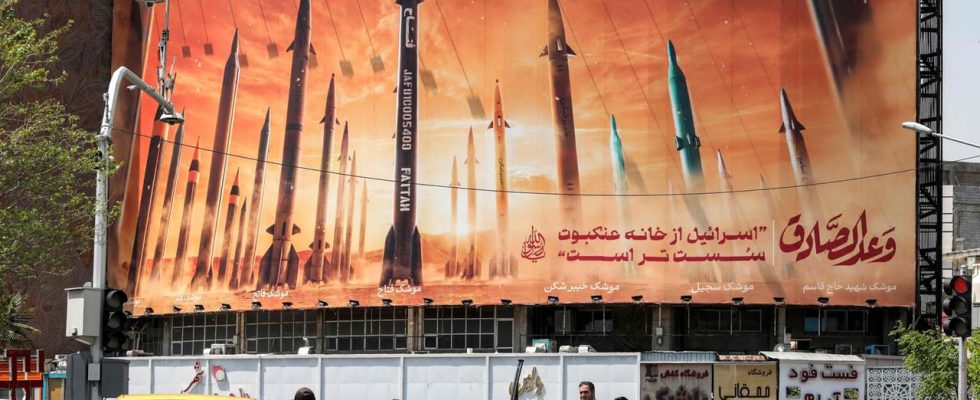interview
The defense against the Iranian attack was a “success” for Israel, says Middle East expert Peter Lintl. Jordan shot down drones, other Arab countries opened their airspace. But can cooperation against Iran last?
tagesschau.de: The Israeli War Cabinet has not yet made a decision on how to respond to this attack. What options does Israel actually have?
Peter Lintl: I think we have to distinguish between the options that exist and the political positions that prevail in the war cabinet. As far as political positions are concerned, Benny Gantz and Gadi Eizenkot – both of whom are members of the war cabinet – had, according to media reports, suggested that Israel launch a counterstrike as soon as the Iranian attack was underway. That would have been more of a symbolic nature and would have repaid the attack. But this was apparently rejected by the other members of the War Cabinet. For two reasons: First, because it was not yet clear at the time how much damage the Iranian attack would cause. And secondly, because it seemed like too little of an answer to the other members.
To person
Peter Lintl is an employee of the Science and Politics Foundation in Berlin and researches Israel and the Middle East conflict in the Africa and Middle East research group.
tagesschau.de: What options would there be now?
Lintl: Of course, there is always the possibility of a direct attack with missiles – but that is unlikely. Then there is what Israel has done in the past: cyberattacks. The third option is attacks on Iranian bases or allies outside Iran. And fourthly, an intelligence operation like we had seen in the past. The big question is, how comprehensive can and should such an answer be? In particular, the USA, the Europeans, but also the regional allies are putting massive pressure on Israel to postpone a possible response and to keep the scope relatively small so that the situation does not escalate further.
tagesschau.de: What influence does this pressure from outside have on Israel’s decision?
Lintl: Certainly the U.S. opinion is heard in Israel. But the assessment of the military situation is also important: How much does the Israeli military feel compelled to react? And of course also the political situation, on which a lot has depended in the last few months: What does Prime Minister Netanyahu think he has to do for domestic political reasons? Where is he afraid that he might risk his coalition? I think these are the factors that need to be looked at. But of course the pressure from the USA is already very great. If Israel ignored these warnings and contributed to an escalation, the consequences for its allies would of course be far-reaching. Nobody can currently imagine or wish for further regional escalation.
tagesschau.de: Israel has succeeded surprisingly well in fending off this attack by Iran – also because Jordan, an Arab state, has sided with Israel. What does this mean strategically?
Lintl: From an Israeli perspective, this was a success. 99 percent of these missiles and drones were repelled. The fact that Jordan took part in shooting down the drones is particularly notable given the tensions that exist between Israel and Jordan over the Gaza war. And it must be added that the United Arab Emirates and Saudi Arabia have also opened their airspace. This was western regional cooperation against Iran.
tagesschau.de: What does this mean for the Gaza war?
Lintl: That depends on how Israel will react. This was a demonstration of solidarity despite great tensions with the Arab states. Now the question is: Do these states think that they can now put even greater pressure on Israel in relation to the Gaza war or not? Conversely, I read an assessment in an Israeli newspaper today that Israel would now have more leeway in the Gaza war if it did not retaliate with great severity against Iran.
tagesschau.de: What conclusions must and can Iran draw from this – militarily, but also in the current conflict around Gaza?
Lintl: The conflict between Israel and Iran will make pacification of the Gaza war more difficult. Hamas has achieved the goal of Iran entering the war. And she has already announced that the hostage negotiations will be suspended, at least for the time being. In my opinion, this was a test run for Iran. They learned a lot from the fact that the attack was largely intercepted. That was also the aim of the matter. At the same time, defense was extremely expensive. There is talk of 1.5 billion euros that the Israeli air defense cost. This cannot be repeated arbitrarily. Perhaps Iran also wants to provoke Israel into a counterattack that its allies cannot support. I think these are strategic considerations that are taking place in Iran.
tagesschau.de: Are there perhaps opportunities that could arise from the current situation?
Lintl: This is also discussed in Israeli politics. People like Benny Gantz see what happened as an alliance against Iran that can be stabilized and expanded. But this requires stronger coordination between Israel and the Arab states. But that depends very much on the further course of the conflict with Iran and also on the further course of the Gaza conflict. I believe we are at a crucial point here as to whether such a cooperation will be consolidated or whether it will fall apart again. That depends very much on whether Israel responds in a way that the Arab states and Western allies can support.
Peter Mücke conducted the interview for tagesschau.de

